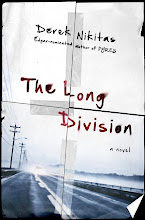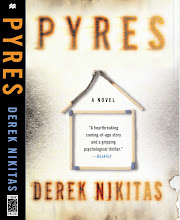This week, finally got to see the Ian Curtis bio-pic, Control.
Wanted to see this movie in the theater, but rarely get out to the theater, except to see special effects extravaganzas that won't look good on my dinky TV when they hit DVD,. Or to see kid's flicks. So in the last couple months it's been just Iron Man and Kung Fu Panda, both pretty good in their own rights.
The Panda movie's got some great visuals and funny shit, but the storyline was pretty rote. Iron Man was great until the "action packed climax," the same point where nearly all superhero movies fall flat. It's the same fight over and over. No divergence from the script. I don't know why people keep wanting to see the hero and the villain bash into each other for fifteen minutes.
These scenes need more cleverness, more intrigue--less brute force. From the previews, The Incredible Hulk looks to be the same deal, just as Ang Lee's (underrated) The Hulk was. Yes, underrated. What Lee did with mimicking comic-book panels and with Bruce Banner's inner turmoil was sharp. What ruins the movie is the dull climax and the crap special effects--really, everything about the Hulk himself, which is certainly a problem.
Downey Jr. made a great Iron Man. I just wanted to be the millionth person to say it. Round the same time I saw Iron Man, I saw another Downey Jr. movie I'd been hearing too much buzz about to ignore--Kiss Kiss, Bang Bang. I don't know how this one slipped by me when it first came out. The dialogue was hilarious, not to mention the monologues. Like the best postmodern treatments, the movie plays as a kind of parody of the detective film, but also runs with the best as a legitimate detective film. Goes right alongside Brick for kick-ass dialogue, though nothing tops Closer in that particular category.
Now, Control. I'm an unabashed devotee of Joy Division, like every goth-at-heart. I buy into the whole enigma. I loved the movie 24 Hour Party People for its treatment of the early 80s Manchester, UK music scene, though I was pissed at its flippant, dismissive treatment of Ian Curtis. Yes, New Order has some good songs, but to give Joy Division's leftovers more clout than Joy Division is near sacrilegious. You see how keyed-up about this I am?
So Control gives us the full effect of Ian Curtis, every personality nuance, every facial tick, every drop of pathos. The gorgeous black-and-white cinematography captures his essence the same way Anton Corbjin, the director, captured Ian in photographs thirty years ago. You can see the devotion to character in the film, sometimes at the expense of story (that is, I'd like to have seen more about Joy Division itself, their rise, etc.; you wouldn't know from the film that the band was even ever famous).
As you might guess, the movie ends abruptly at Ian's death, which is treated with such a mixture of delicacy and rawness that I'm still in awe of it, even having known beforehand exactly how and when the man's life ends up. Yeah, I'd like to have seen more of what happened after he died, but you get that in Party People. Together the two movies, so different in tone, would make an excellent double-header--a more thorough exploration of the band (and what came afterward).
Supposedly the movie is based on Ian's wife's book about their relationship, so obviously a lot of the focus is on her character and their marital turmoil. This is as it should be, though I'm not sure Ian would've fared differently if he'd not married Debbie. He was a tragic figure to begin with, at least in my own mythic version of his life. I hate to say it, but there was a sort of aesthetic dignity, a fruition, in his death, that gave his music its power: "this is the crisis I knew had to come/destroying the balance I've kept" ("Passover"). That's like the mantra for every tragic hero in lit history, all the way back to Oedipus.
Yeah, I'm always on about not taking an artist's bio into consideration when judging the work, but Ian is an exception. He was a sacrifice to art, plain and simple. It's sick to think this way, to justify a suicide or untimely death--but isn't art sometimes bigger, more important, than the mortality of the person who creates it? Would we care so much about The Doors, Jeff Buckley?
Everybody wants to go see Heath's Joker next month because Heath is dead, and frankly it's going to add a dimension to the role. I've even heard suggestions that the Joker killed Heath, the psychological strain of playing him. Sounds like a stretch to me--we're talking about a comic book character, folks--but you never know.
Be honest: how many of you writers out there wouldn't sacrifice your very life if it meant the sacrifice would allow you to write one of the ten greatest novels of the 21st Century? I'm not trying to be morose, really. Death is a cosmic travesty, every. single. time. (but then travesty is pathos!)
I really don't know how I would answer the question, but then I don't have the terminal gift that Ian Curtis had, so I don't need to fret about it. I'll let my characters live out that fatalistic fantasy. That's noir, after all. Still, people justify sacrifices for nations and religions all the time, so why not art?
Wanted to see this movie in the theater, but rarely get out to the theater, except to see special effects extravaganzas that won't look good on my dinky TV when they hit DVD,. Or to see kid's flicks. So in the last couple months it's been just Iron Man and Kung Fu Panda, both pretty good in their own rights.
The Panda movie's got some great visuals and funny shit, but the storyline was pretty rote. Iron Man was great until the "action packed climax," the same point where nearly all superhero movies fall flat. It's the same fight over and over. No divergence from the script. I don't know why people keep wanting to see the hero and the villain bash into each other for fifteen minutes.
These scenes need more cleverness, more intrigue--less brute force. From the previews, The Incredible Hulk looks to be the same deal, just as Ang Lee's (underrated) The Hulk was. Yes, underrated. What Lee did with mimicking comic-book panels and with Bruce Banner's inner turmoil was sharp. What ruins the movie is the dull climax and the crap special effects--really, everything about the Hulk himself, which is certainly a problem.
Downey Jr. made a great Iron Man. I just wanted to be the millionth person to say it. Round the same time I saw Iron Man, I saw another Downey Jr. movie I'd been hearing too much buzz about to ignore--Kiss Kiss, Bang Bang. I don't know how this one slipped by me when it first came out. The dialogue was hilarious, not to mention the monologues. Like the best postmodern treatments, the movie plays as a kind of parody of the detective film, but also runs with the best as a legitimate detective film. Goes right alongside Brick for kick-ass dialogue, though nothing tops Closer in that particular category.
Now, Control. I'm an unabashed devotee of Joy Division, like every goth-at-heart. I buy into the whole enigma. I loved the movie 24 Hour Party People for its treatment of the early 80s Manchester, UK music scene, though I was pissed at its flippant, dismissive treatment of Ian Curtis. Yes, New Order has some good songs, but to give Joy Division's leftovers more clout than Joy Division is near sacrilegious. You see how keyed-up about this I am?
So Control gives us the full effect of Ian Curtis, every personality nuance, every facial tick, every drop of pathos. The gorgeous black-and-white cinematography captures his essence the same way Anton Corbjin, the director, captured Ian in photographs thirty years ago. You can see the devotion to character in the film, sometimes at the expense of story (that is, I'd like to have seen more about Joy Division itself, their rise, etc.; you wouldn't know from the film that the band was even ever famous).
As you might guess, the movie ends abruptly at Ian's death, which is treated with such a mixture of delicacy and rawness that I'm still in awe of it, even having known beforehand exactly how and when the man's life ends up. Yeah, I'd like to have seen more of what happened after he died, but you get that in Party People. Together the two movies, so different in tone, would make an excellent double-header--a more thorough exploration of the band (and what came afterward).
Supposedly the movie is based on Ian's wife's book about their relationship, so obviously a lot of the focus is on her character and their marital turmoil. This is as it should be, though I'm not sure Ian would've fared differently if he'd not married Debbie. He was a tragic figure to begin with, at least in my own mythic version of his life. I hate to say it, but there was a sort of aesthetic dignity, a fruition, in his death, that gave his music its power: "this is the crisis I knew had to come/destroying the balance I've kept" ("Passover"). That's like the mantra for every tragic hero in lit history, all the way back to Oedipus.
Yeah, I'm always on about not taking an artist's bio into consideration when judging the work, but Ian is an exception. He was a sacrifice to art, plain and simple. It's sick to think this way, to justify a suicide or untimely death--but isn't art sometimes bigger, more important, than the mortality of the person who creates it? Would we care so much about The Doors, Jeff Buckley?
Everybody wants to go see Heath's Joker next month because Heath is dead, and frankly it's going to add a dimension to the role. I've even heard suggestions that the Joker killed Heath, the psychological strain of playing him. Sounds like a stretch to me--we're talking about a comic book character, folks--but you never know.
Be honest: how many of you writers out there wouldn't sacrifice your very life if it meant the sacrifice would allow you to write one of the ten greatest novels of the 21st Century? I'm not trying to be morose, really. Death is a cosmic travesty, every. single. time. (but then travesty is pathos!)
I really don't know how I would answer the question, but then I don't have the terminal gift that Ian Curtis had, so I don't need to fret about it. I'll let my characters live out that fatalistic fantasy. That's noir, after all. Still, people justify sacrifices for nations and religions all the time, so why not art?



No comments:
Post a Comment